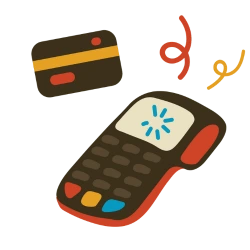TABLE OF CONTENTS
- What Is a Card Not Present (CNP) Transaction?
- How Does Card Not Present Work?
- How Much Does It Cost to Process CNP Transactions?
- Card Present vs Card Not Present
- What Is Card Not Present Fraud?
- What Is Chargeback Fraud for CNP Transactions?
- Why Should Your Business Accept Card Not Present Transactions?
- Tips for Merchants who Accept Card Not Present Transactions
If your business processes credit card transactions, you might be considering accepting card-not-present (CNP) payments. This type of transaction allows you to accept payments without a physical card. While this may seem risky, it allows business owners to process online payments and a host of other transactions. As businesses compete in offering customers more convenient payment options, it’s essential to consider this transaction choice for your own business.
This comprehensive guide to CNP transactions will help you determine if this is a viable payment option for your business. It also explores card-not-present fraud and methods to minimize your exposure to this risk.
What Is a Card Not Present (CNP) Transaction?
What does CNP stand for? A card-not-present (CNP) transaction refers to a payment conducted without a physical credit card, which is considered a higher-risk transaction. For example, paying for a meal over the phone by providing your credit card details to the restaurant’s staff member is a CNP transaction. This is an essential payment choice for businesses offering online and over-the-phone payment options.
It’s easier for customers to pay for goods and services through CNP transactions. Also, in taking upfront CNP payments, businesses avoid the risk of a customer not showing up to pay for an item or service.
How Does Card Not Present Work?

CNP transactions work in a variety of ways, depending on the type of transaction and your merchant processing partner. There are two primary types of CNP transactions: in-store and online.
In-store CNP transactions occur when the cardholder and/or physical card are not present. For example, someone may call and pay over the phone. In this case, a staff member manually inserts the credit card details into the virtual terminal to process the transaction.
Online CNP transactions occur when a customer uses an online payment gateway to pay for an item or service. This is a common option for digital businesses that process payments.
How Much Does It Cost to Process CNP Transactions?
The price of a CNP transaction varies depending on your credit card processing partner. Generally, CNP transactions cost more money than standard card-present transactions. This is due to payment processing providers viewing CNP transactions as riskier due to their exposure to fraud. Without any ability to verify the individual with the credit card number is the true cardholder, it can be harder to confirm the payment is legitimate.
Fortunately, there are now numerous tools to help business owners detect fraudulent payments. But still, the price of CNP transactions remains higher, on average, than card-present transactions. Your credit card processing fees, including those for CNP transactions, should be clearly outlined in your agreement with your credit card processing company. As this is now a major form of payment worldwide, all credit card processing firms have specified CNP transaction charges.
Card Present vs Card Not Present
The difference between card-present and CNP charges typically relies on the presence, or lack thereof, of the card. Below is a closer look at examples of each of these payment types.

Examples of card not present transactions
As discussed, a CNP transaction occurs when you cannot physically scan a card. Let’s explore the most common examples of CNP charges below:
- Paying for a good or service over the phone by reading the card number.
- Purchasing a good or a service over the internet.
- Arranging the purchase of a produce via mail order by detailing credit card information on a form.
- Buying a good or service in-store with a card that won’t scan.
If the card is present but damaged to the point that it cannot be read by a machine, it may have to be entered manually. In this case, it’s considered a CNP transaction, regardless of whether the card is at the store. For this reason, you’ll pay CNP transaction fees on this type of payment.

Examples of card present transactions
On the other hand, a card-present transaction occurs when the cardholder has the physical card, which is functioning correctly, in their possession at the time of payment. Let’s explore some examples below:
- Swiping a card, during which the payment is accepted via magnetic strip.
- Inserting a card into an EMV terminal, during which the payment is accepted via electronic chip.
- Utilizing contactless (tap-and-go) options, during which the payment is accepted via RFID technology.
- Using mobile payment platforms (Apple Pay, Samsung Pay, etc.).
Because these types of payment are considered more secure than the CNP alternatives, they attract lower transaction costs. This is one of the primary advantages associated with card-present charges.
What Is Card Not Present Fraud?
CNP fraud occurs when an individual or organization uses a non-present credit card to make an illegitimate payment. For example, if someone steals someone’s credit card number and purchases items online, that’s CNP fraud.

What percentage of credit card fraud is through card not present?
Card-not-present fraud is much more prevalent than other types of credit card fraud. While this is partly due to card-not-present transactions having more weaknesses that can be exploited, it’s also because EMV chips make it harder to commit fraudulent card-present transactions.

How does CNP fraud occur?
CNP fraud occurs when someone uses another person’s credit card to pay for transactions online or over the phone. It can also occur if a staff member at an organization uses a credit card number to pay for their own item or service.

Who is liable for card not present fraud costs?
Unfortunately, the merchant is liable for CNP fraud, which is why it’s so critical to use various security measures to prevent fraudulent charges.

What are common examples of CNP fraud?
There are many common forms of CNP fraud. Let’s explore some examples below:
- Fraudulent Online Payment: After stealing another person’s credit card number and details, someone use this card number to purchase products online.
- Fraudulent Payment Over the Phone: An individual steals a credit card number and calls a business to purchase goods or services. They then pick up the items before the cardholder is able to report the card number as stolen.

How to prevent card not present fraud
If you want to prevent fraud while handling card-not-present transactions, you need to have controls in place to verify the identity of the cardholder. This means that you need to work with a credit card processing partner that values safety and security. Many credit card processing companies now use zip code verification, two-factor authentication, and a host of other tools to prevent this type of fraud.
In some cases, it may be best to avoid phone payments altogether. With these types of payments, it’s much harder to verify if the cardholder is the person making the order. You also won’t have the same fraud detection tools that protect online payments.
What Is Chargeback Fraud for CNP Transactions?

Chargeback fraud occurs when an individual files a chargeback against your business. This is a common form of fraud for both card-present and card-not-present transactions. If an individual files a chargeback on a transaction at your business, you will need to prove that the cardholder is the person that processed the transaction.
This can be difficult if you don’t have the proper controls in place to prove who conducted the transaction. As it can be challenging to prove that someone who made a payment online or over the phone is the true cardholder, card-not-present transactions are a prime target for this type of fraud.
Chargebacks can also happen by mistake, but they may still impact your ability to have a merchant account. For example, “friendly fraud” occurs when someone requests a chargeback without fraudulent intentions. This might be due to the customer not recognizing your name on their bank statement.
Chargeback fraud is an issue for many reasons. First, it can result in you covering the costs of a transaction that was made by the cardholder simply because they are defrauding you. Secondly, if you have too many chargebacks, your payment processing company may no longer support your payments, as chargebacks can be a sign of a company providing fraudulent goods and services.

How to prevent chargeback fraud
To prevent chargeback fraud, you should have controls in place to ensure that you can prove the cardholder is the individual processing the transaction. This means that you should require PIN payments or check the signature or identity of the individual paying. You should also use a payment processing company that can offer zip code verification, IP address verification, and other tools that can help you prove the cardholder is the individual that made the transaction.
Keeping valid records of all orders, payments, and customer details can be used to prove that an order was sent to the cardholder’s correct address. If someone is attempting to file a chargeback because they don’t understand your shipping or return policy, it’s essential to prove that you have clearly stated your policies on your website. Always make sure your website clearly displays warranties, policies, product descriptions, and other core details. Also, ensure they’re up-to-date and accurate.
Again, there are instances in which someone may process a transaction and mistakenly file a chargeback because they do not recognize the charge on their bank statement. This is known as friendly fraud. For this reason, it’s recommended that your trading name be used as your payment processing name. This reduces the chances of friendly fraud impacting your business. Unfortunately, even if the chargeback is due to a mistake with your trading name, it can impact your ability to retain your merchant account.
Why Should Your Business Accept Card Not Present Transactions?
If you’re worried about CNP fraud, you may wonder if accepting this type of transaction at all is worth it. Because CNP transactions can result in fraud and often cost more than card-present transactions, it might seem like a good idea to minimize your exposure to this type of payment. Still, the benefits of accepting CNP transactions are clear: If you cannot accept this type of payment, you will not be able to provide any convenient online services to your clients. And online shopping continues to increase in popularity, with more consumers shopping online now than ever before. This means that any ambitious business owner wanting to expand past basic brick-and-mortar premises will need to accept online payments. The best way to do this is with a high-risk merchant account that is equipped to handle the risk of CNP transactions.
While some stores have sought hybrid models, they offer less convenience. For example, a store may allow for online or over-the-phone shopping, but require the customer to come into the store to pick up the item and process payment. While this avoids the need for CNP payments, it adds a layer of inconvenience to the transaction, which can cost you a sale.
If you run a small hospitality business that doesn’t offer online services, offering CNP payments may seem like an unnecessary risk. Otherwise, it’s hard to see how a modern business can survive without offering this convenient transaction option.
Tips for Merchants who Accept Card Not Present Transactions
Now that you understand the CNP meaning, it’s time to overview some tips for merchants who want to accept this type of payment:
- Use a payment processing company that has in-built credit card fraud tools.
- Require full addresses and customer information with each CNP order.
- Clearly display your shipping and return policies on your website.
- Ensure that your product or service descriptions are accurate.
- Keep organized files with details of customer shipping addresses.
Remember: Choosing the correct high risk payment processing company can help you reduce your exposure to CNP fraud.






